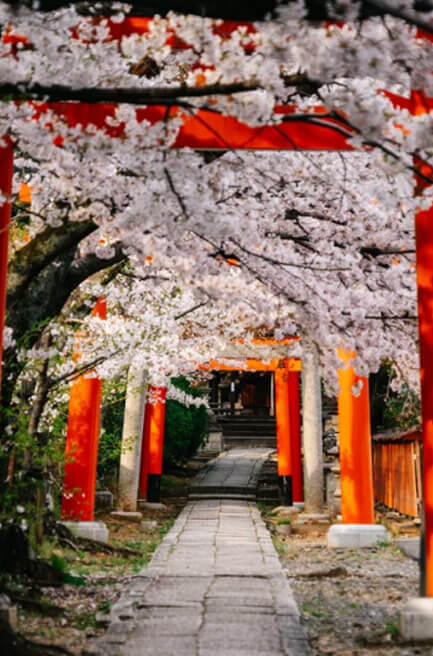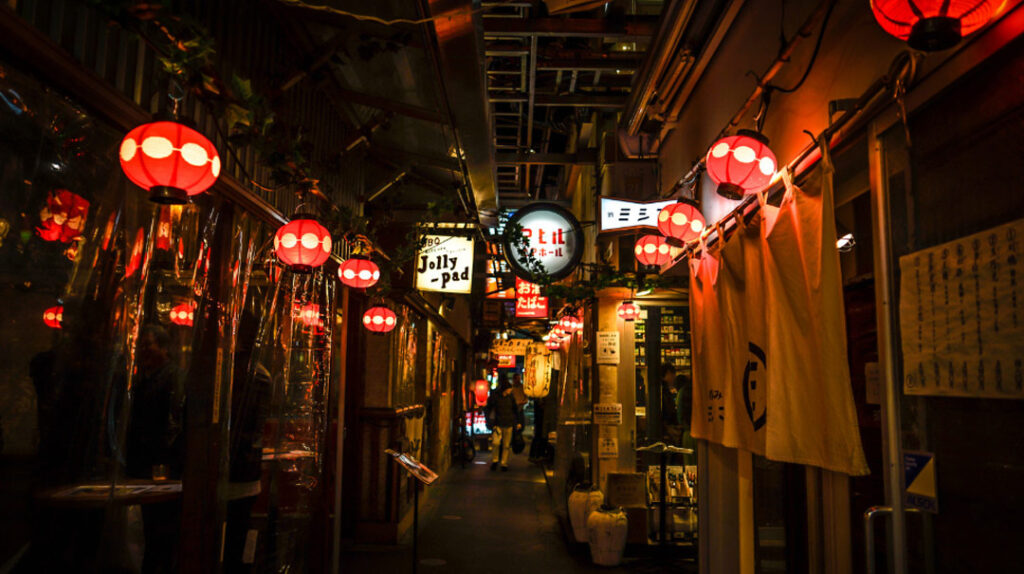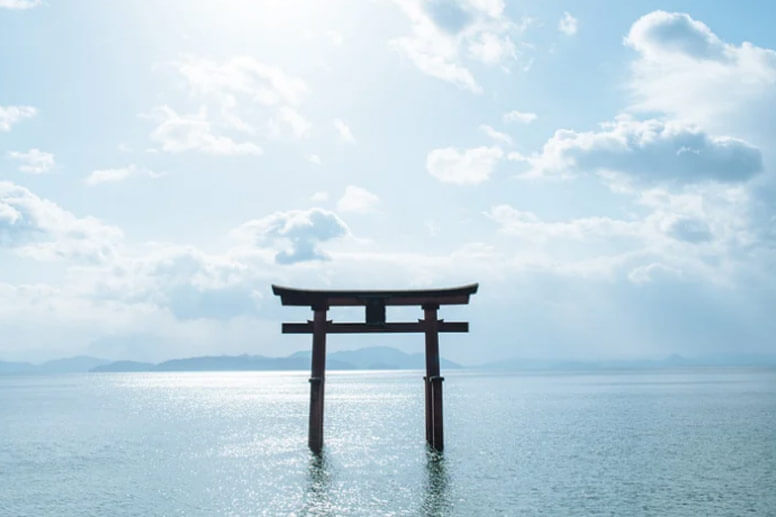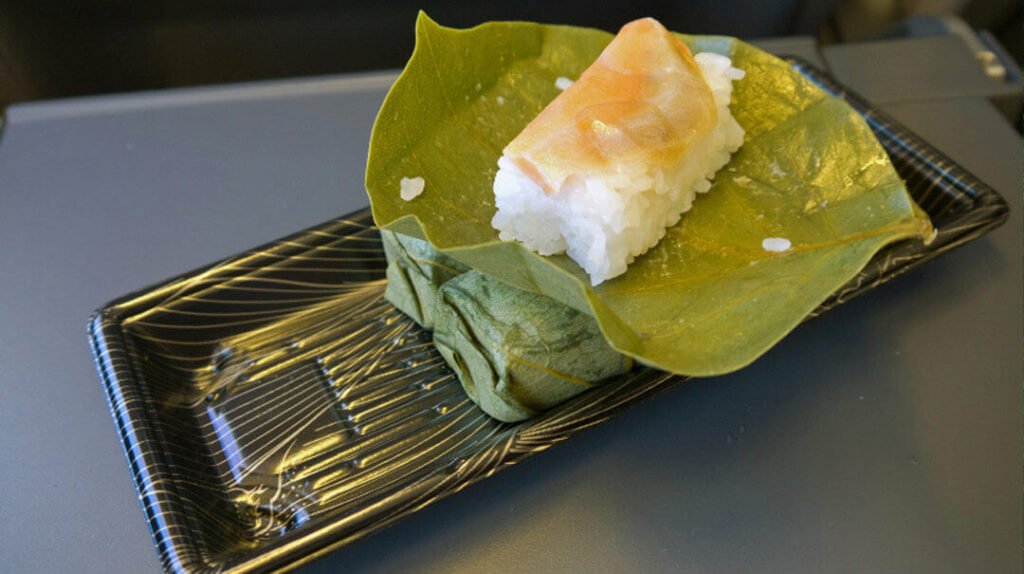Japan, a land of mesmerizing contrasts, is a realm where tradition harmonizes effortlessly with modernity, and where the ancient past coexists harmoniously with the cutting-edge future. This captivating archipelago, nestled in the western Pacific Ocean, boasts an allure that has fascinated travelers for centuries. As we embark on this journey of discovery, let’s delve into the heart of Japan, unraveling its unique identity, and discovering the incredible experiences that await those who venture to its shores.
Japan: Where Tradition Meets Innovation
Imagine a country where meticulously crafted tea ceremonies unfold in centuries-old wooden tea houses, just a stone’s throw away from neon-lit skyscrapers where robotics and technology innovations redefine the future. This is Japan, a nation that skillfully balances reverence for its deep-rooted traditions and an insatiable thirst for innovation.
Cherry Blossoms and Seasons of Splendor
One of Japan’s most iconic and celebrated features is its ever-changing seasons, each offering a unique spectacle of natural beauty. Witness the ethereal beauty of cherry blossoms in spring, where parks and streets burst into shades of pink and white, marking the arrival of hanami (flower viewing) season. In contrast, the fiery hues of autumn foliage, or koyo, paint landscapes with vibrant reds, yellows, and oranges, making autumn a picture-perfect time to explore.
The Art of Japanese Cuisine
Japan’s culinary artistry is renowned worldwide. Delight your taste buds with sushi so fresh it melts in your mouth, savor bowls of steaming ramen in hidden alleys, and discover the intricate beauty of kaiseki, a multi-course meal that’s also a work of art. From street food stalls to Michelin-starred restaurants, Japanese cuisine offers a diverse and delectable journey.
Landscapes of Tranquility and Adventure
Beyond its bustling cities, Japan boasts a diverse natural landscape that ranges from serene bamboo groves to towering volcanoes. Hike through dense forests, soak in soothing hot springs (onsen), or surf along pristine coastlines. Japan’s geography offers something for every adventurer, from snow-capped mountains in Hokkaido to tropical beaches in Okinawa.
The Essence of Japanese Hospitality
Japanese hospitality, or omotenashi, is a philosophy deeply ingrained in the culture. From the moment you arrive, you’ll experience the warmth and genuine care of the people. It’s in the meticulous service at ryokans (traditional inns), the courtesy of shopkeepers, and the kindness of strangers. Japan’s hospitality ensures that every traveler feels welcomed and cherished.
With this captivating introduction to Japan, let’s explore the essential details and insights that will enhance your journey and help you make the most of your visit to this extraordinary country.

Tokyo Japan

Japan Facts
Japan Travel Facts
Country Name: Japan, known as Nippon (日本) in Japanese, means “origin of the sun,” symbolizing its eastern location. This name reflects Japan’s geographical significance as the easternmost country on the Asian continent. The Land of the Rising Sun, as it’s often called, is a place where tradition and innovation beautifully coexist.
Time Zone: Japan Standard Time (JST), UTC+9. Japan’s unique time zone places it nine hours ahead of Coordinated Universal Time (UTC). This time zone ensures that the country is among the first to greet each new day, emphasizing its “Land of the Rising Sun” moniker.
Currency: Japanese Yen (JPY). The Japanese yen is the official currency of Japan. It’s a currency known for its intricate designs and the presence of historical figures and cultural symbols on its banknotes.
Religion: Shintoism and Buddhism are the two major religions in Japan, coexisting harmoniously and influencing daily life and traditions. Shintoism, deeply rooted in nature worship, and Buddhism, emphasizing enlightenment and meditation, have left an indelible mark on Japan’s spiritual landscape. Visitors will encounter numerous shrines and temples, some dating back centuries, while exploring the country.
Emergency Numbers: In case of emergencies, Japan has designated numbers for swift assistance. Dial 110 for police assistance and 119 for fire and ambulance services. The efficiency and responsiveness of Japan’s emergency services contribute to the country’s reputation for safety.
Population: Japan has a population of over 126 million people, making it one of the world’s most densely populated countries. Despite its relatively small land area, Japan’s cities are vibrant and bustling, showcasing a blend of modernity and tradition.
Interesting Fact: Japan is renowned for its punctuality and efficiency. Trains are a quintessential mode of transportation in the country, and they are famous for their on-time performance. Japan boasts the world’s most extensive network of high-speed railways, including the iconic Shinkansen, which allows travelers to traverse the country quickly and comfortably. The precision and reliability of Japanese transportation reflect the nation’s commitment to orderliness and quality of service.
How to Get There
How to Get to Japan
Japan is well-connected to the world, making it accessible to travelers from various countries. Here’s how to reach this captivating destination:
Air Travel: Most international travelers arrive in Japan by air. Japan has several major international airports, with Narita International Airport in Tokyo and Kansai International Airport in Osaka being the primary gateways. Other international airports include Haneda Airport in Tokyo, Chubu Centrair International Airport in Nagoya, and Fukuoka Airport in Kyushu. These airports are well-connected to major cities around the world.
Flight Options: Numerous international airlines offer flights to Japan from major cities worldwide. Japanese carriers like Japan Airlines (JAL) and All Nippon Airways (ANA) provide excellent service and connectivity. You can also consider connecting flights through major Asian hubs like Seoul, Hong Kong, or Singapore.
Best Time To Go
Best Time to Go to Japan
Japan experiences distinct seasons, each offering a unique charm to travelers. The best time to visit depends on your preferences and the experiences you seek:
Spring (March to May): Spring is famous for cherry blossoms (sakura), making it an ideal time to witness Japan’s iconic pink and white blooms. Mild temperatures and blooming landscapes create a picturesque atmosphere.
Summer (June to August): Summer brings warmer temperatures and vibrant festivals. It’s an excellent time for beach vacations in places like Okinawa. However, be prepared for higher humidity levels and occasional typhoons.
Autumn (September to November): Fall foliage (koyo) is a highlight during autumn, with vibrant red and gold hues blanketing the country. The weather is pleasant, making it an ideal time for outdoor activities.
Winter (December to February): Winter is perfect for snow enthusiasts, with excellent skiing and snowboarding opportunities in regions like Hokkaido and Nagano. Experience the magic of winter illuminations in cities like Sapporo and Tokyo.

Best Places To Visit
Best Places to Visit in Japan
Japan is a land of diverse landscapes, from ancient temples to futuristic cityscapes. Here are some of the best places to explore:
Tokyo: Japan’s capital city offers an unparalleled blend of tradition and modernity. Visit the historic Asakusa district with its Senso-ji Temple and Nakamise-dori shopping street. Experience the lively streets of Shibuya and the serene atmosphere of Meiji Shrine.
Kyoto: Known for its cultural richness, Kyoto is home to over 2,000 temples and shrines. Don’t miss the iconic Kinkaku-ji (Golden Pavilion) and the enchanting Arashiyama Bamboo Grove.
Osaka: Often called the “Nation’s Kitchen,” Osaka is a food lover’s paradise. Try street food at Dotonbori, visit Osaka Castle, and experience Universal Studios Japan.
Hiroshima: A city with a powerful message of peace, Hiroshima is home to the Hiroshima Peace Memorial Park and Atomic Bomb Dome. Miyajima Island, known for the “floating” torii gate at Itsukushima Shrine, is a short ferry ride away.
Nara: Nara is famous for its friendly deer population and historic temples. Explore Todai-ji Temple, which houses a massive bronze Buddha, and wander through Nara Park.
Hokkaido: Japan’s northernmost island is a paradise for nature lovers. Enjoy skiing in Niseko during winter and explore the lavender fields of Furano in summer.
Kanazawa: This coastal city on the Sea of Japan is known for its well-preserved samurai districts, Kenrokuen Garden, and fresh seafood markets.
Kyushu: Japan’s southernmost main island boasts hot springs (onsens), active volcanoes, and historical sites. Explore Aso’s volcanic landscapes, relax in Beppu’s hot springs, and visit Nagasaki’s Peace Park.
Nagoya: Home to Nagoya Castle and the Osu Kannon Temple, Nagoya offers a taste of traditional Japan. Don’t forget to try the city’s famous hitsumabushi, grilled eel over rice.
Koyasan: Located in the Kii Peninsula, Koyasan is a sacred mountain with over 100 temples. Experience a temple stay (shukubo) and immerse yourself in Buddhist traditions.
Travel Advice
Travel Advice for Japan:
Japan is a country known for its orderliness, safety, and unique customs. Here are some essential travel tips to ensure a smooth and enjoyable journey:
Respect Local Customs: Japanese culture values etiquette and respect. Bow as a form of greeting, remove your shoes when required, and be mindful of local customs.
Punctuality is Key: Trains and schedules in Japan are renowned for their punctuality. Be on time and adhere to schedules meticulously.
Learn Basic Phrases: While English signs are common in tourist areas, knowing a few basic Japanese phrases is helpful and appreciated.
Cash is Essential: Cash is widely preferred over cards, especially in rural areas. Carry enough cash and be prepared for cash-based transactions.
Dispose of Trash Properly: Follow strict waste disposal rules in Japan, and carry a small bag for your trash, as public bins are rare.

Kyoto Japan

Food and Drink
Food and Drink in Japan:
Japanese cuisine is renowned worldwide for its unique flavors and artful presentation. Here are some must-try dishes and drinks in Japan:
- Sushi and sashimi: Fresh raw fish atop vinegared rice.
- Ramen: Hearty noodle soup with various toppings.
- Tempura: Lightly battered and deep-fried seafood and vegetables.
- Okonomiyaki: Savory pancakes cooked with various ingredients.
- Matcha: Green tea powder used in traditional tea ceremonies and desserts.
- Sake: Japan’s famous rice wine, available in various grades.
- Izakayas: Japanese-style pubs offering a wide range of drinks and small dishes.
Activities
Activities in Japan:
Japan offers a diverse range of activities to suit all interests:
- Onsen (hot springs): Relax in natural hot springs found throughout the country.
- Sumo wrestling: Catch a sumo tournament or even try sumo training.
- Tea ceremonies: Experience the traditional art of tea preparation.
- Kimono dressing: Wear a beautiful kimono and stroll through historic districts.
- Hiking and nature: Explore scenic trails in national parks like the Japan Alps.
- Cherry blossom viewing: Witness the stunning beauty of sakura in spring.
- Karaoke: Sing your heart out in private karaoke rooms.
- Traditional arts: Learn ikebana (flower arranging), calligraphy, or origami.
- Visit Ancient Temple Sites
Culture
Culture of Japan:
Japanese culture is a blend of ancient traditions and modern innovations:
- Shinto and Buddhism: Explore shrines and temples that are an integral part of Japanese life.
- Geisha culture: Witness the artistry of geisha in Kyoto’s Gion district.
- Traditional arts: Enjoy Noh and Kabuki theater, or attend a traditional festival like Gion Matsuri.
- Architecture: Admire the elegance of traditional Japanese architecture in castles and temples.
- Martial arts: Experience or watch disciplines like kendo, judo, and aikido.
- Pop culture: Immerse yourself in modern trends like anime, manga, and J-pop music.
Language
Local Language of Japan:
Japanese is the official language of Japan. While English signage is common in tourist areas, learning a few basic Japanese phrases can enhance your travel experience and interactions with locals.
- Hello: こんにちは (Konnichiwa)
- Thank you: ありがとう (Arigatou)
- Excuse me/sorry: すみません (Sumimasen)
- Yes: はい (Hai)
- No: いいえ (Iie)
- Please: お願いします (Onegaishimasu)
- Goodbye: さようなら (Sayonara)
Accommodation
Accommodation in Japan:
Japan provides a diverse selection of lodging options to cater to various budgets and tastes:
Tokyo:
- Hotels: Tokyo offers a plethora of hotel options, ranging from luxury establishments to budget-friendly choices.
- Ryokans: Experience traditional Japanese hospitality in the heart of the city.
- Capsule Hotels: For solo travelers, capsule hotels provide a unique and compact accommodation experience.
Kyoto:
- Ryokans: Immerse yourself in Japanese culture by staying in a traditional inn with tatami-mat rooms and serene gardens.
Osaka:
- Hotels: Osaka boasts a variety of hotels catering to different budgets and preferences.
- Minshuku: Explore family-run guesthouses for a cozy and local touch.
Hokkaido:
- Resort Hotels: Enjoy ski resorts and natural beauty while staying in comfortable resort hotels.
Hiroshima:
- Hotels: Hiroshima offers a range of accommodations, including international hotel chains.
Okinawa:
- Beach Resorts: Experience the tropical paradise of Okinawa by staying in beachfront resorts.
Nara:
- Traditional Guesthouses: Nara offers unique stays in traditional Japanese guesthouses.
Nara Japan
Visa Requirements
Japan Visa Requirements:
Visa requirements for Japan vary depending on your nationality and the purpose of your visit. Here’s a general overview:
- Tourist visa: Many nationalities can enter Japan visa-free for tourism purposes for up to 90 days.
- Working or long-term visas: Required for those planning to work, study, or reside in Japan for an extended period.
- Visa application: You’ll typically need to apply for a visa at a Japanese embassy or consulate in your home country.
- Required documents: These may include a valid passport, visa application form, proof of financial stability, and an itinerary.
Essential Things
Japan Essentials:
Some essential tips for a smooth journey in Japan:
- Cash is king: While credit cards are accepted, carrying cash is advisable, as many places may not accept cards.
- Respect local customs: Bow when greeting, remove your shoes when entering homes or traditional places, and abide by local etiquette.
- Efficient transportation: Japan has an extensive and efficient public transportation system, including Shinkansen (bullet trains).
- Pocket Wi-Fi: Rent a pocket Wi-Fi device to stay connected while exploring.
- Convenience stores: These stores (konbini) are a traveler’s best friend, offering everything from snacks to ATMs.
- Tipping: Tipping is not customary in Japan; instead, express gratitude with polite words or gestures.

